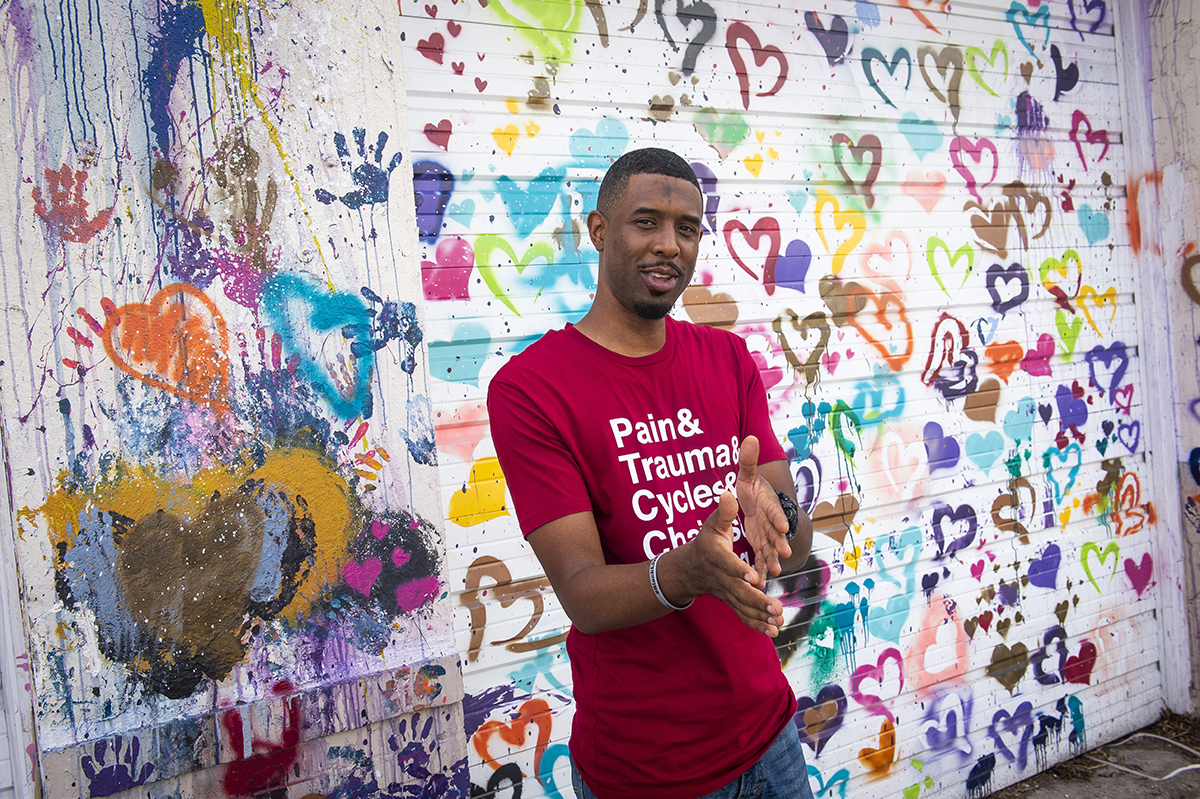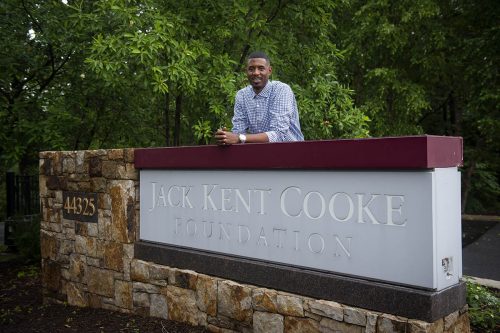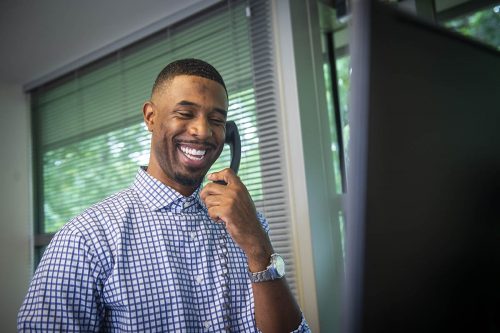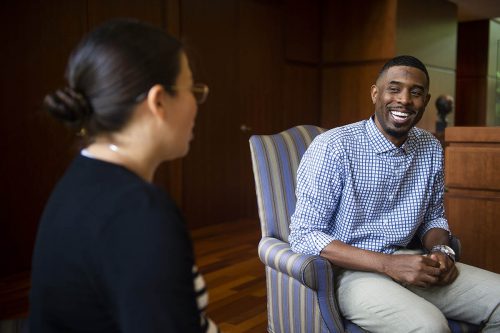Alan Royal Promotes Equity and Inclusion to Help Scholars Succeed
The alumnus mentors young students as they pursue higher education and careers.

Alan Royal mentors young scholars as a senior program manager for outreach and partnership at the Jack Kent Cooke Foundation. Photo by Lisa Helfert
Alan Royal Promotes Equity and Inclusion to Help Scholars Succeed
The alumnus mentors young students as they pursue higher education and careers.
When William “Alan” Royal ’06 (MEd ’11) was a student at TCU, he performed original hip-hop songs and recorded albums, including Commencement, in which he pondered whether his post-college life would include rap performance.
“I wasn’t interested in it for fame or in it for the sake of popular music,” Royal said. “I wanted to have an authentic message.”
Royal’s love of the genre remains part of his “daily vernacular” and is woven into his work, first as a student adviser and now as senior program manager for outreach and partnerships at the Jack Kent Cooke Foundation.
The organization, based in Lansdowne, Virginia, provides college scholarships to high-achieving students with financial need. Since 2000, the foundation has awarded $190 million to nearly 2,500 students.
Royal’s job is to get the word out about how the available funds and mentoring support can help students succeed in higher education. His contact with scholars starts as early as seventh grade.
During one welcome event, Royal donned a bucket hat, a few necklaces and an OutKast shirt, then grabbed a microphone, jumped onstage and burst into a “college rap” icebreaker. His performance had the desired effect: Students felt less anxious and were in the right mindset to imagine a college-enabled future, he said.

At the Jack Kent Cooke Foundation, Alan Royal works with students as early as seventh grade. Photo by Lisa Helfert
On the job, Royal does a lot of speaking, writing and data compiling, as well as teaching students to communicate effectively. Royal said his undergraduate degree in English taught him “to think critically and be thoughtful about my communication style.”
“What I appreciate about Alan are his interpersonal skills and inclusiveness,” said Cecilia Marshall, director of strategic initiatives at the foundation. “He has an amazing skill for meeting people where they are at and relating to them.”
Sarah Kashef said being paired with Royal was “one of the best things that ever happened to me.” The daughter of immigrants from Egypt and Morocco, Kashef relied on Royal to guide her family through the barriers many first-generation college students encounter. She said he was a positive role model and a mentor when she was choosing prep courses, applying to colleges and adjusting to campus life.
In 2018, Kashef earned an undergraduate degree from Columbia University in New York. She now works as a global policy and advocacy associate at the nonprofit organization IntraHealth International.
Unlimited success is the goal, but it isn’t always easy for students from diverse or economically disadvantaged backgrounds to crack the code of higher education.

On the job, Alan Royal does a lot of speaking, writing and data compiling, as well as teaching students to communicate effectively. Photo by Lisa Helfert
“There’s been a push lately for understanding what equity and inclusion actually means,” Royal said. “Now we’re asking: How do we make education truly equitable socioeconomically, racially and ethnically? We’re trying to move the needle on some of these things, but there’s still a lot of work to do.”
When Royal, a native of Longview, Texas, arrived on TCU’s campus, he realized the student body was wealthier and less racially diverse than at his high school. Although his adjustment to college life was “fairly smooth,” he said it got easier when he pledged the black fraternity Alpha Phi Alpha and found professors eager to mentor him.
At institutions of higher learning, Royal said, “We need to be sure that staff is actively engaged in conversations and we set up a structure and support system for how to respond to circumstances [of inequity].”
Universities also need to better understand their role in welcoming, engaging and helping students of diverse backgrounds navigate college life. “It’s not just that they deserve to be treated fairly,” he said. “They’re bringing something valuable to your institution.”

Alan Royal wants to improve equity in higher education. He shares his experiences at TCU with students considering college as he encourages them to pursue their dreams. Photo by Lisa Helfert
Today’s college students “understand the times we are in and no longer accept social ills and social inequity,” Royal said. “I’m surprised at how comfortable they are talking about it. I’m still growing into it.”
Royal stays in touch with many of the students he advises, connecting with them by phone or text, often discussing their favorite musical artists.
“There are some generational differences,” said Shawn Duncan, a junior art history major at the University of North Carolina at Chapel Hill who is co-president of a campus hip-hop student organization. “I prefer to have melodies and a flow with the beat. He’s looking for people saying the right things.”
For Royal, doing the “right things” means sharing his experiences while pushing messages of equity in higher education.
“It actually won’t work well in the U.S. if we don’t get on this equity mentality,” Royal said. “It’s going to harm us … [and] what’s most startling to me is we don’t have more of these conversations.”

Your comments are welcome
Comments
Related reading:
Alumni, Web Extras
TCU Magazine Podcast: Alan Royal
The alumnus speaks to students and teaches them to communicate effectively.
Alumni, Features
Duane Bidwell and the Complexity of an Interreligious World
Through his teaching and writing, the professor at Claremont School of Theology affirms the fluidity of religion.
Alumni, Features
English Degree Equals Opportunity Across the Globe
Jennifer Klein used her command of language as a consultant for the World Bank and a children’s advocate.